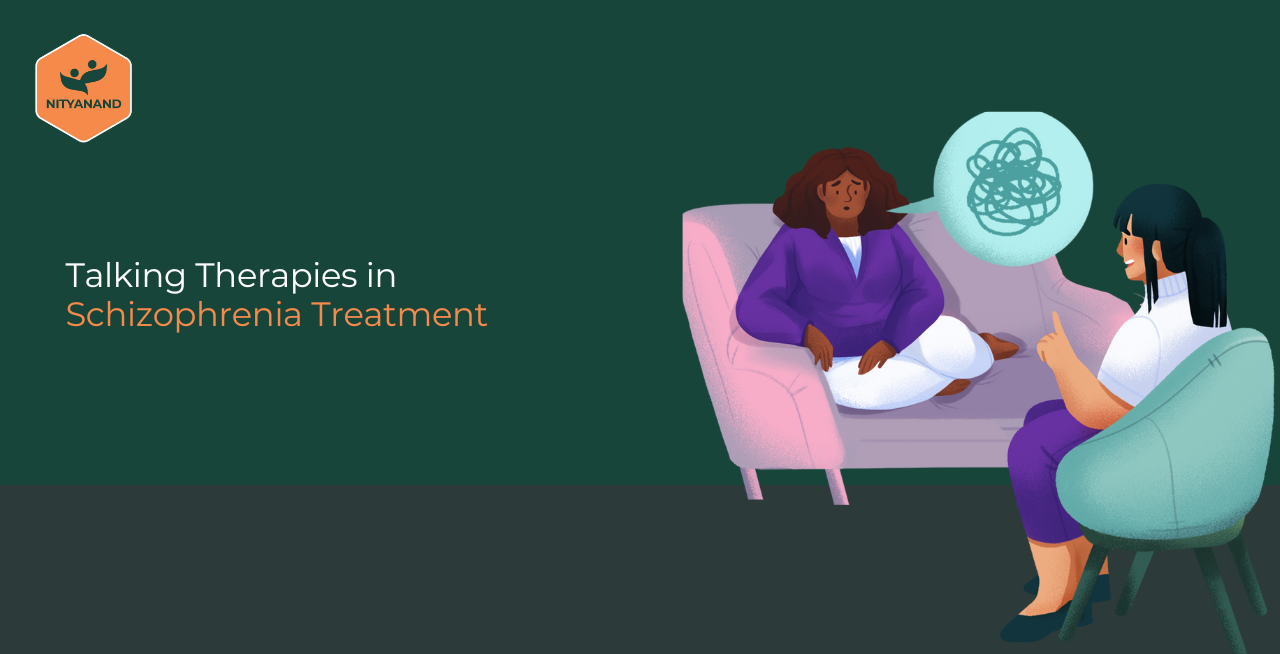How Can Talking Therapies Help Individuals with Schizophrenia?


Schizophrenia is a complicated mental illness that affects a person’s thoughts, emotions, and behaviours. It often leads to symptoms such as hallucinations, delusions, and difficulties in social interactions. According to the WHO, Schizophrenia affects approximately 24 million people or 1 in 300 people (0.32%) worldwide. This rate is 1 in 222 people (0.45%) among adults. This highlights the urgency of awareness of therapies that help with schizophrenia.
Schizophrenia treatment commonly involves a combination of medication and therapy. While antipsychotic medication helps manage chemical imbalances in the brain, talking therapies play a crucial role in improving coping mechanisms and social functioning. This blog explains how different forms of talking therapies can support individuals in their recovery journey.
Understanding Talking Therapies
Talking therapies provide structured psychological support, helping individuals with schizophrenia manage their thoughts and emotions more effectively.
- Cognitive Behavioural Therapy (CBT): CBT is widely used in schizophrenia rehabilitation centres to help individuals identify and modify distorted thought patterns. Studies suggest that CBT can significantly reduce persistent hallucinations and delusions, enabling individuals to develop healthier coping strategies.
- Family Therapy: Research indicates that family involvement in schizophrenia treatment reduces relapse rates and enhances emotional support. Family therapy focuses on improving communication, educating loved ones about schizophrenia symptoms, and creating a more understanding home environment.
- Supportive Psychotherapy: Encourages individuals to discuss their challenges, provides emotional support, and enhances self-esteem.
- Group Therapy: Helps rebuild social skills by allowing individuals to socialise with others who share similar experiences.
Benefits of Talking Therapies for Schizophrenia
Talking therapies offer numerous advantages that go beyond symptom relief. By addressing both the emotional and cognitive challenges associated with schizophrenia, these therapies empower individuals to manage their condition more effectively. Below are some of the key benefits:
- Symptom Management: Talking therapies help individuals understand and manage their symptoms, particularly hallucinations and delusions. Therapy provides structured techniques to reduce the distress caused by these symptoms, leading to a better sense of control.
- Building Coping Skills: Schizophrenia can be overwhelming, but therapy equips individuals with effective coping mechanisms. Techniques such as mindfulness, stress reduction, and problem-solving strategies help individuals manage stress and reduce the likelihood of relapse.
- Improving Insight: Lack of insight is a common issue among individuals with schizophrenia, leading to poor medication adherence. Therapy encourages self-awareness, helping individuals understand their condition, recognise early warning signs, and stay committed to their treatment plan.
Incorporating Therapy into Schizophrenia Treatment Plans
For therapy to be truly effective, it must be integrated into a comprehensive treatment plan that considers the individual’s medical, emotional, and social needs. Combining talking therapies with medication offers a well-rounded approach to managing schizophrenia and improving long-term recovery outcomes.
- Complementary Role of Therapy: Medication addresses the biological aspects of schizophrenia, but therapy is essential for managing emotional and psychological challenges. Combining both approaches creates a more comprehensive treatment plan, improving long-term recovery outcomes.
- Personalised Treatment Plans: Every individual experiences schizophrenia differently. Personalised therapy plans consider factors such as symptom severity, personal preferences, and social circumstances, ensuring that treatment is both effective and sustainable.
Challenges and Considerations
Despite its effectiveness, accessing and implementing talking therapies for schizophrenia presents several challenges. Stigma, affordability, and availability of mental health professionals often prevent individuals from receiving the therapy they need. Addressing these barriers is essential to making treatment accessible to everyone. Many individuals hesitate to seek therapy due to social stigma, financial constraints, or lack of awareness about available treatment options.
Increasing public education and expanding access to schizophrenia rehabilitation centres can help overcome these obstacles. A well-trained mental health professional plays a vital role in therapy’s success. Experienced therapists provide structured guidance, build trust, and help individuals develop resilience, making therapy an integral part of schizophrenia treatment.
The Bottom Line
Talking therapies are a powerful tool in schizophrenia treatment, helping individuals manage symptoms, develop coping skills, and gain a deeper understanding of their condition. When combined with medication, therapy improves overall recovery outcomes and enhances quality of life. Addressing barriers to therapy and seeking professional support can make a significant difference in long-term recovery.
Get Compassionate Schizophrenia Treatment at Nityanand Rehab Centre in Pune
Are you or someone you love is struggling with schizophrenia? At Nityanand Rehab Centre, we offer personalised therapy programs designed to help individuals manage schizophrenia symptoms and regain control over their lives. Our team of skilled professionals provides comprehensive treatment plans, including medication support and evidence-based therapies. Reach out to Nityanand Rehab Centre today and take the first step towards recovery.
FAQs
1. What is schizophrenia, and how does it affect individuals?
Schizophrenia is a serious mental health condition that affects thoughts, emotions, and behaviour, leading to symptoms such as hallucinations, delusions, disorganised thinking, and withdrawal from reality.
2. How do talking therapies help in schizophrenia treatment?
Talking therapies like Cognitive Behavioural Therapy (CBT), family therapy, and group therapy help individuals manage symptoms, develop coping mechanisms, and improve their understanding of the condition. They complement medication by addressing emotional and cognitive challenges.
3. Can schizophrenia be treated with therapy alone?
While therapy plays a significant role in managing schizophrenia, it is not a substitute for medication. The most effective treatment combines medication with therapy to address the biological and psychological aspects of the disorder.
4. How does family therapy benefit individuals with schizophrenia?
Family therapy educates family members about schizophrenia symptoms and helps improve communication and support at home. It reduces stress, enhances relationships, and lowers relapse rates.
5. Where can individuals with schizophrenia access professional therapy?
Schizophrenia rehabilitation centres provide structured therapy programs designed to help individuals manage symptoms and improve their quality of life. Seeking professional help ensures personalised treatment plans tailored to individual needs.

